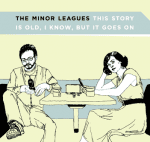
Experts don’t recommend this plan of attack: releasing an indiepop rock opera about relationships and dating when you’re in your mid-20s. But the grand scale presentation fits — the mid-20s period, since mildy more mature than adolescent lamentation and giddiness, is served by the epic approach (on a shortish album) but is also prone to treating itself as deserving the epic approach. You can work with it, but you’re going to need the hooks, and fortunately the Minor Leagues have them in enough force to pull off their ambition. Coupled with intelligent lyrics, This Story Is Old, I Know, But it Goes On works outside its focus group.
The band does exactly what it should to be comfortable and catchy, but still interesting. There are a ton of influences here, from ’60s rock to Britpop (vocalist/keyboardist Ben Walpole is pretty clear on his Pulp fandom) to maybe Elephant 6 stuff to whatever the kids are calling indie these days that isn’t dragging you down. At times you could imagine Phil Spector working with this group (“The Love That Never Was”), Grandaddy helping write their music around the time of Sumday (“Travel Agent”), or Saturday Looks Good to Me picking them up (standout track “Good Boys”). It’s a bit of a riot going on, which isn’t surprising given the album’s enormous credit listing (five members, five people featured, and 18 people given “With:” credit, primarily for laughing or clapping hands).
The resultant sound is memorable and idiosyncratic, but what ends up pulling me in is what I worried about given the opera concept at the title of the first cut, “Midlife Crisis at 25”: the lyrics. The group could have spun out a set of trite privileged disappointments, but instead they artfully created precise characters (“Let’s see if I’ve got this straight — you like primates and garage sales?”) in specific situations, even if that precision concerns the desire for movement (“Travel Agent”, “Elsewhere”). The people are neither flawed heroes nor noble losers. They’re just people muddling through. When our male lead sings, “So breakup with him, go out with me / It’s not difficult”, it’s not a crisis of conscience (that comes later) or a big moment. It’s a thing that people do.
That doesn’t mean the characters aren’t reflective. With its casual acoustic stroll building to a more orchestral arrangement, “Projections of a Person” aptly captures that transition we have to make between our imaginings of a partner, and the reality of an actual person. The line “You’re not everything I’ve dreamt of / But you’re everything that’s cost me sleep” depicts this moment of epiphany (a fortunate thing to have). The bridge deals with the shortcomings of language (a not atypical use of language), of trying to turn old words for new feeling, and the song can find its only resolution: “It is worth it.”
The statement might be questioned later. After all, these people are 25 and 21, so they’re nearly bound to mess up (which is not the same as to fail). There are temptations, and “dangerous friendships” creep toward illicit territory, and, well, kisses happen. Remorse can itself be damaging, if not properly released, and comparing minor sins to the major ones of others doesn’t work. “Good Boys” wraps all these issues into a straightforward rock number. If “God is watching on high with his trademark forgiving eye”, the romantic partners aren’t so merciful (at least not to themselves).
The album doesn’t leave us in a broken state. “The Love That Never Was” offers a strange and ambiguous sort of resolution, realizing the method to move on, to grow out of it, yet continually looking back, asking forgiveness now not for actions taken but for “telling this story again tomorrow”. Yet there is a tomorrow, and the path through it is delineated, so maybe we — I mean he — can move on. But, wow, how did you miss the woman in snow boots who’s “extolling the virtues of Jarvis Cocker”?
The Minor Leagues don’t give us an easy way out of it. We’re stuck in the past, rolling up on us like Faulkner in a record store or a diner. It takes some time to get around that, and if 25 can’t see 30, yes, we can forgive that, and we can wait. The “quarter-life crisis”, as a friend named it for me most of a decade ago, mostly requires waiting and thinking, and even when you’re not 25, it might be a concept that needs operatic scale to start to sort through. After all, the experts are old (older than me even) and not always right. For all their characters’ confusion, the Minor Leagues seem to get it.

![Call for Papers: All Things Reconsidered [MUSIC] May-August 2024](https://www.popmatters.com/wp-content/uploads/2024/04/all-things-reconsidered-call-music-may-2024-720x380.jpg)



